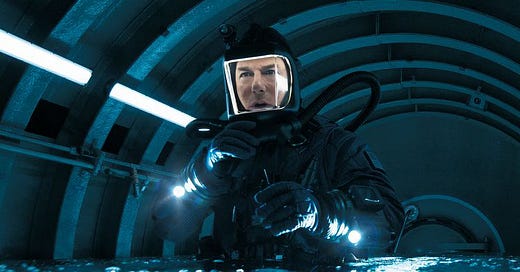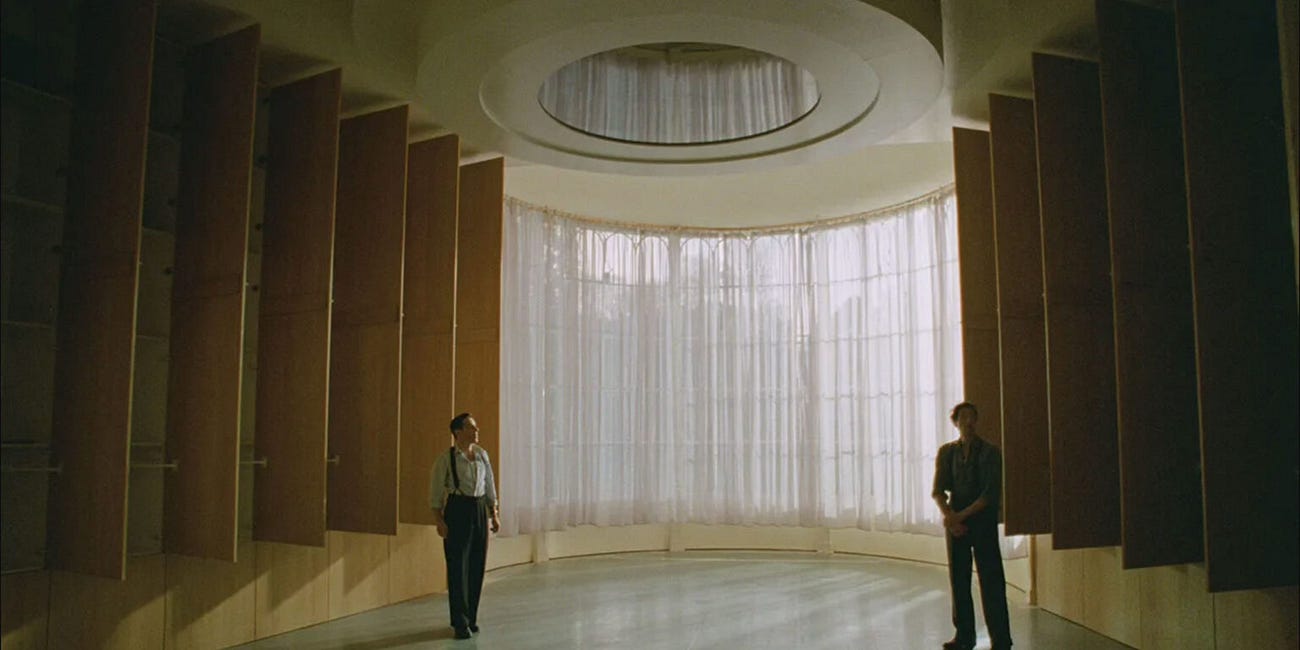MOVIE REVIEW - Mission: Impossible - The Final Reckoning (Dir. Christopher McQuarrie, 2025)
"No one is safe from Phineas Freak"
Tom Cruise and friends are back with the eighth and (supposed) final entry in their nearly thirty year action adventure espionage, Mission: Impossible, series. Behind the camera, long time Cruise collaborator, Christopher McQuarrie, returns for the fourth time as we follow directly on from the events of 2023’s Dead Reckoning Part One. While a messy and distracting first half may be off-putting for some, a tremendously exciting third act proves to be overloaded with the crowd pleasing thrills that will undoubtably send many fans home happy.
This time, the world’s greatest madman super spy, Ethan Hunt (Cruise) and his team must fight against an AI known as, ‘The Entity’, and prevent it from obtaining control of the world’s nuclear weapon supply and annihilating the human race. A spanner is thrown into the works, however, when The Entity’s former ally, Gabriel (Esai Morales) decides The Entity is his to control - a tool to allowing him to rebuild the world however he sees fit - and he will stop at nothing to fulfil his goal. As political tensions rise and paranoia reaches a fever pitch, Hunt’s team will be stretched to the very limits of their abilities in order to save the world one last time.
The Mission: Impossible series is an interesting beast, it seems to have manoeuvred through the trends of the last thirty years of blockbuster cinema without too many missteps. Over a period of time that saw James Bond battle with an identity crisis, Jason Bourne rise to success only to then stumble through two attempted re-launches, and the rise of the mega-budget CGI boredom simulators presented by the Marvel and DC Cinematic Universes, M:I has always kept ticking over with a self-assured confidence that is admirable. Whether in its origins as an auteur showcase, allowing directors as diverse as Brian De Palma, John Woo, JJ Abrams, and Brad Bird, to flex their muscles in the world of high budget espionage flicks, or, in its more modern form, as Cruise and McQuarrie’s modern blend of Indiana Jones and serialised storytelling, M:I has always excelled at producing summer blockbuster films which feel finely crafted and artisanal. Unfortunately, however, that usual slickness is lacking for a large part in the early stages of this instalment. The film is constantly flicking between flashbacks, recaps, references to earlier films, sometimes unnecessarily. It almost feels like an exercise in making a mainstream narrative feature film out of other films, as if it were accelerating the canon constructing, easter egg dropping arms race started by the MCU and recent Star Wars projects. I don’t think this is a decision made out of a lack of confidence in the material, or out of a studio mandated need to tie thirty years of film together, but simply out of a need to come to a grand conclusion and statement on what the purpose of these eight films have been. How the actually comes across in practice, however, is the sensation that you are being beaten senseless by information before the film has ever really gotten moving. Now, one can argue, and I’m willing to entertain the idea somewhat, that this actually a coherency between the form of the film and its content, a manifestation of the information manipulating Entity parasitically corrupting the very film we’re watching. Perhaps this has some merit, and when we actually do see that within the film when Hunt confronts the Entity directly, it is a breathtaking experience, I am just not sure, if such a meta textual technique is being deployed, that it is working here as well as it could do. And those who are particularly sick of the modern trend of either bringing back microscopically minor characters from 30 years ago, or tying new characters to those older characters for seemingly little reason, are going to be thoroughly annoyed by some of the decisions made throughout the film.
Longtime readers might expect me to plunge into analysis of how M:I as a franchise, and this film in particular, function as standard bearers for a post-ideological approach to the spy thriller. How, for better or ill, they depict a world in which ( multinational) men, and women, of action who serve only the ‘greater good’ and who act outside of national allegiances and jurisdiction to solve the problems the bureaucrats can’t. Obviously, this claim to post-ideology is a distinctly American ideology and one which tackles the world with a kind of optimism that only the Americans can produce. Lots of critics are going to be picking apart what this duology has to say about technology. The overreach of artificial intelligence being the key idea, but also this great conflict between analogue and digital, real and artificial, which feels like it is fighting for the very soul of cinema itself. But, for the purposes of this as a review and not an in-depth analysis, I want to focus on how the film, in its second half, finds its feet and adds another stone to the pantheon of great action adventure cinema Once the film finds its feet, around the point where the full plan to find the submarine Sevastopol (which harbours The Entity’s source code) comes into the fore, we are treated to a runaway bus of rampaging excitement right until the end of the credits roll. I couldn't help but be reminded of the blistering pace one sees when they watch one of Steven Spielberg’s Indiana Jones films, in particular, Raiders of the Lost Ark. The film bounces from set piece to set piece with a joyous reckless abandon. The submarine interior, in which McQuarrie makes use of the rotating set we saw used so excellently in the previous instalment’s train climax, takes the baton from the underwater sequence in 2011’s Mission: Impossible - Ghost Protocol, and turns the tension dial up to ten. The shifting of the water level, and how it completely alters the dynamics of the environment, combined with the tight time constraints of the mission, make it impossible to look away from. As for the finale, which I shall not reveal too many details of, I was at a loss trying to work out which parts were live, which parts were green screen, which parts were remote controlled, and which parts were stunt piloted. I was so completely lost in the sheer scale of the thing. All of the aspects of the film that weren’t working for me, its messy plotting, its overbearing sentimentality, its sense of self-congratulation, all drifted away. Tom Cruise had locked in an arm-bar on the side of a plane, in mid air, and isn’t that what the magic of cinema is all about?
A lot of people are going to have problems with this movie, it is, in so many ways, too much movie. In its excesses, it represents both the best and worst of everything present in the Mission: Impossible franchise. Equal parts saccharine and triumphant, the film managed to successfully charm this long time series fan. The mystique that Cruise has been able to cultivate over the last thirty years, the stunts, and the slavish devotion to maintaining the sacred nature of the cinematic experience, may be too much for some, but I’d challenge anyone to deny that the man can entertain the general public. In a world where the quality of mass consumer entertainment is ever decreasing in quality, I’m glad their are some in the industry, like Christopher McQuarrie and Tom Cruise who are willing to be ambitious and a little messy in order to provide a well-crafted entertainment experiences. Ultimately, I find the claims that this is the series’s worst a little overblown. I would personally place it higher than 2, 3, and 4. I look forward to seeing what these two do next if, indeed, this turns out to be the final outing for Ethan and his rag tag band of world savers.
Ryan Sweeney
Other film reviews:
MOVIE REVIEW: The End (dir. Joshua Oppenheimer, 2024)
If you were to build a completely artificial life, of course that life would be a musical. At least, that is the impression I get when I listen to the vast majority of filmmakers. In Joshua Oppenheimer’s (The Act of Killing, The Look of Silence), The End,
MOVIE REVIEW: Flow (Dir. Gints Zilbalodis, 2024)
What do: a cat, a golden retriever, a capybara, a ring-tailed lemur, and a secretary bird have in common? Gints Zilbalodis’s new animated feature film, Flow (2024), brings these animals together in a desperate fight for survival against the rising tides. While the lack of any dialogue may raise concerns for any parent considering taking their children t…
MOVIE REVIEW: The Brutalist (dir. Brady Corbet 2024)
Is it possible for a film to dream our failed utopias for us? Should it even try? These are the questions that arose while I watched Brady Corbet’s 215 minute epic, The Brutalist. Ultimately, I believe these are the questions which the period drama must ask of itself if it is ever to reconcile itself with a present it is engaged in unavoidable conflict …







